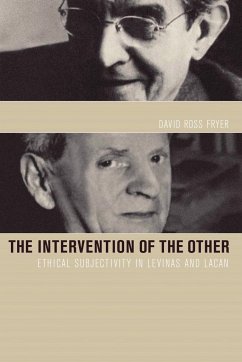The Intervention of the Other deftly brings the thought of Emmanuel Levinas and Jacques Lacan into fruitful dialogue through a comparative analysis of these two seemingly disparate thinkers. Emmanuel Levinas, Lithuanian-born French phenomenologist of the nonphenomenon, and Jacques Lacan, controversial French psychoanalyst and (post)structuralist theorist of the Freudian Unconscious, lived and wrote in the same city, at the same time, among the same colleagues, often using the same language and the same sources, sometimes writing to the same audiencesóand yet they never wrote to or about one another. Following Sartre, Levinas thought that Freud had fundamentally misunderstood the nature of consciousness when he posited the Unconscious as a second, but hidden, consciousness. Despite this suspicion of psychoanalysis, however, Levinasí own work celebrated a certain something that could not be contained by thought. For his part, Lacan was suspicious of philosophical ethics. He subscribed to a Freudian critique of ethics as pathogenic. Nevertheless, he saw his own work as fundamentally about a kind of ethics, specifically an ethics concerned with how people live their lives in an already normative society. While the two never engaged with each otherís thought directly, Levinas and Lacan were interested in many of the same questions: What is the nature of the self? What is it to be a subject? Can the ethical be grounded in a post-foundationalist world? Through close textual analysis, David Ross Fryer shows how Levinas and Lacan offer two ways of positing the ethical subject in the post-humanist landscape of contemporary thought.
Hinweis: Dieser Artikel kann nur an eine deutsche Lieferadresse ausgeliefert werden.
Hinweis: Dieser Artikel kann nur an eine deutsche Lieferadresse ausgeliefert werden.








